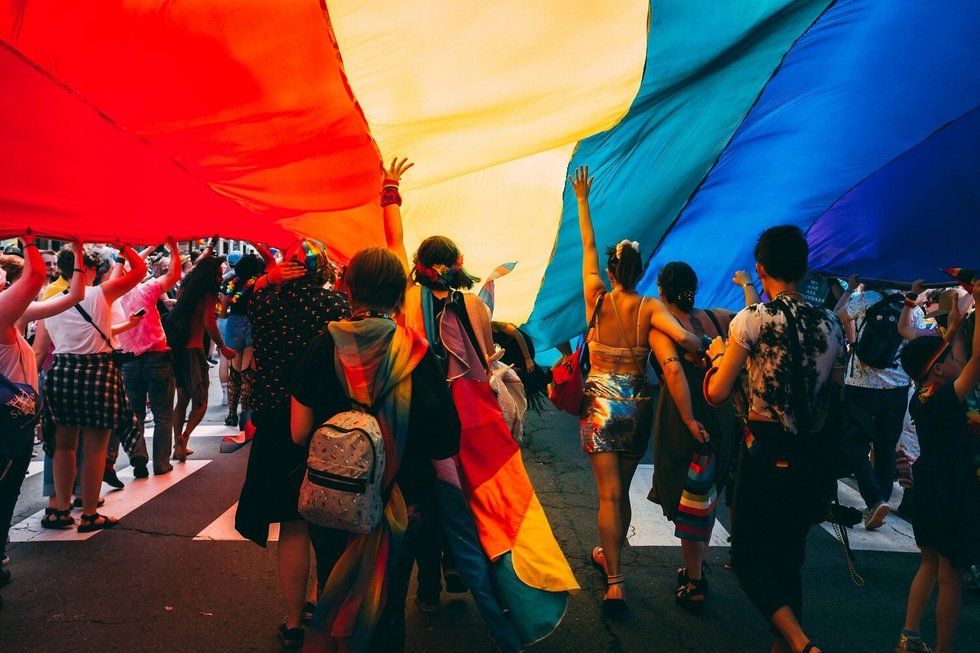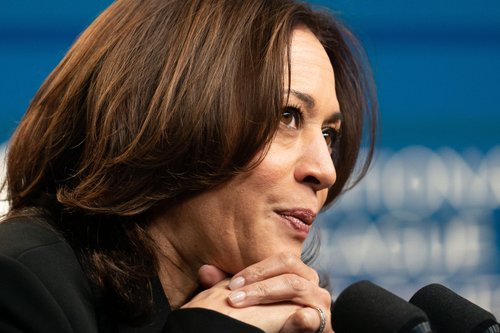Pride under pressure: How companies are navigating controversies in 2024
Jun 27, 2024
8 mins


US Editor at Welcome to the Jungle
In May, ahead of LGBTQ+ Pride month, the National Park Service (NPS) issued a directive prohibiting employees from marching in public events that “could be construed as agency support for a particular issue, position, or political party,” according to internal documents shared with NBC News. Signed by NPS Deputy Director Frank Lands, the policy aimed to avoid endorsing specific political positions and reinforce existing guidelines.
However, the NPS has long allowed uniformed rangers to participate in Pride marches, including some of the country’s largest, like those in New York City. The policy faced immediate resistance, with an anonymous NPS employee telling the Washington Blade, “Pride is not political—it’s a celebration of who we are,” adding, “Morale is just so low right now. There’s not a lot of fight left in us.”
In response, Secretary of the Interior Deb Haaland reversed the directive later in May. “I want to ensure that every employee has the opportunity to thrive in a safe, inclusive, and respectful environment,” she wrote in an email to all NPS employees obtained by The Advocate. The reversal solidified the agency’s support of in-park Pride events, allowing uniformed employees to participate in Pride marches with their supervisor’s approval.
The NPS situation highlights broader concerns about corporate and institutional support for Pride. Companies, either eager to support their Queer communities or to tap into a profitable market, regularly launch advertising campaigns, Pride-themed product lines, and partnerships with LGBTQ+ influencers. However, in 2023, many faced conservative backlash with intense political and cultural pressures.
Following last year’s response to Pride, are more companies retreating their public support and capitulating to conservative rhetoric, fumbling policy reversals like the NPS, or standing firm in their commitments? Where do these “canceled” companies stand now in 2024?
Where do companies stand on Pride in 2024?
Target
Target, a historical supporter of Pride, faced significant backlash and threats from conservative groups over its 2023 Pride merchandise. In response, the retailer moved Pride items from store entrances to the back and reduced the overall collection due to employee safety concerns. “Since introducing this year’s collection, we’ve experienced threats impacting our team members’ sense of safety and wellbeing while at work,” Target stated in a press release.
Despite threats of harassment in stores, two verified Target workers told Business Insider in 2023 that their LGBTQ+ employees felt frustrated and alienated following Target’s actions.
Human Rights Campaign (HRC) President Kelley Robinson expressed disappointment with Target’s decision, as reported by Erie Gay News: “LGBTQ+ people are in every zip code in this country, and we aren’t going anywhere. Target’s decision is disappointing and alienates LGBTQ+ individuals and allies at the risk of not only their bottom line but also their values.”
Christina Hennington, Target’s Chief Growth Officer, explained to investors after Pride 2023, as reported by NPR, “The reaction is a signal for us to pause, adapt, and learn so that our future approach to these moments balances celebration, inclusivity, and broad-based appeal.”
This indeed hinted at a rework of strategy. For 2024, Target announced that it will limit its Pride merchandise this year to home goods and adult clothing. Based on past sales, it will only be available in about half of its stores and online, basing this decision on “historical sales performance.” Though Target succumbed to sales pressure, they still tout their support for LGBTQ+ communities with internal employee experiences to “learn, reflect, celebrate, and connect” as well as corporate representation at country-wide Pride events—they’re just less vocal about it than years past.
Bud Light
In 2023, Bud Light released a marketing campaign featuring transgender influencer Dylan Mulvaney, leading conservative groups to boycott the brewery and other companies supporting “woke” causes, dubbing the movement “Bud Lighting.” This resulted in a substantial drop in sales. After the initial boycott, Anheuser-Busch InBev, Bud Light’s parent company, posted a statement from CEO Brendan Whitworth stating that the company “never intended to be part of a discussion that divides people” and that their business is about “bringing people together over a beer.”
Bud Light, known for its long history of supporting LGBTQ+ rights, found itself at a crossroads. The company’s attempt to appease both sides resulted in dissatisfaction from both conservative critics and LGBTQ+ supporters alike. The Wall Street Journal reported that Bud Light sales fell 17% in the week following the initial backlash.
In recent months, hostility toward the brand has faded and though sales have stabilized, they still stand well below pre-boycott levels, as reported by ABC News. Bud Light has remained relatively quiet about its specific plans for this year. According to Forbes, Bud Light hasn’t mentioned Pride Month on social media and has instead promoted its partnership with the Ultimate Fighting Championship (UFC) and MMA fighter Dustin Poirier. Let’s hope Bud Light isn’t choosing sales over values…
The US Navy
The US Navy sparked a wave of adversity after promoting a video on its social media featuring Rear Admiral Mike Brown discussing the Navy’s efforts to support LGBTQ+ service members for the 2023 Pride. Critics argued that the Navy’s focus on inclusivity was detrimental to its primary mission. One user even commented on Instagram, “Let’s see how our woke military responds to the requirement of force projection when the fight starts. This is NOT who we are at all.”
In response, the Navy removed the Pride-themed imagery from its social media accounts shortly thereafter. An Instagram post featuring a fighter jet with a rainbow-colored wake and the words “Pride Month 2023” was among the deleted content.
Despite one Pride post, the US Navy didn’t make such statements in 2024, though it did change its profile photo for other heritage months, such as Asian American, Native Hawaiian, and Pacific Islander Heritage Month in May and Women’s History Month in March. What kind of precedence are they setting?
The North Face
The North Face also fell under attack from conservative groups over its 2023 Pride campaign featuring drag queen Pattie Gonia. The campaign, part of their “Summer of Pride” series, was intended to highlight inclusivity and accessibility in the outdoors. However, it was met with calls for boycotts from figures such as Lauren Boebert and Marjorie Taylor Greene, who criticized the company on social media and fueled a wave of conservative opposition. Critics argued that the campaign was inappropriate and accused The North Face of pandering to political correctness.
Amidst the retaliation, The North Face stood by its campaign. In a statement to Gist last year, the company reaffirmed its commitment to inclusivity: “The North Face has always believed the outdoors should be a welcoming, equitable, and safe place for all. We are honored and grateful to support partners like Pattie Gonia who help make this vision a reality.”
For 2024, Forbes reported that The North Face made no announcement of the event this year, and it does not appear to have released a Pride collection online as in previous years, though it did make a celebratory Pride post on Instagram. Isn’t support for LGBTQ+ communities more than just a box to be checked?
A business case for Pride
So it seems that some of the biggest Pride controversies of 2023 resulted in companies succumbing to conservative pressure. However, all is not dark clouds covering the rainbow. The HRC’s Corporate Equality Index for 2023-2024 shows a 9% increase in corporate participation from the previous year, meaning that more companies are actively engaging in LGBTQ+ equality initiatives.
Furthermore, a Gravity Research survey of 200 communications and corporate affairs executives, including those from Fortune 500 companies, revealed that most brands are not changing their plans for Pride Month. The survey found that only 18% of corporations felt pressured by the threat of conservative backlash to adjust their 2024 Pride plans, while 13% were unsure, indicating a cautious yet steady approach to supporting Pride initiatives.
So, despite what we see in the media, most brands are continuing to promote LGBTQ+ equality, and there’s a compelling reason for this. According to LGBT Capital, LGBTQ+ individuals in the US had an estimated $1.4 trillion in purchasing power by the end of 2022, with a global purchasing power of $3.9 trillion.
And this purchasing demographic is on the rise. A recent Gallup report revealed that 7.1% of US adults now identify as LGBTQ+, up from 5.6% four years ago and 3.5% in 2012. And that’s only going to increase. This surge in LGBTQ+ identification is driven by younger generations, with over one in five Gen Z adults (ages 18-26 in 2023) and nearly one in 10 millennials (ages 27-42) identifying as LGBTQ+, each generation being about twice as likely as the preceding one to do so.
The business case for equality goes beyond profitability. Pride’s primary benefit is its genuine support for LGBTQ+ rights, which not only promotes better employee morale, productivity, and retention but also enhances a company’s brand reputation, attracting a socially conscious workforce and customer base. Most importantly, it demonstrates a commitment to equality and human rights, benefiting both the company and society.
Plus, the majority of the American population doesn’t mind Pride support. A survey conducted by GLAAD and Ipsos last year found that Americans are almost twice as likely to support companies that face criticism for backing LGBTQ+ people compared to supporting the critics themselves. Furthermore, it found that two out of three Americans are neutral to positive about Pride merchandise in stores, and nearly three-quarters of Americans feel the same about a company offering Pride merchandise.
So, are any companies bouncing back from the backlash to keep enticing these big spenders? Let’s look at how some companies are standing firm against conservative protests and continuing to support their Pride campaigns and initiatives.
Companies doubling down on Pride
Starbucks
The Starbucks Workers United union accused the company of restricting Pride decorations in several stores, a move that led to a week-long strike involving over 3,000 employees across more than 150 locations in the US. The union claimed that the company had banned Pride displays due to safety concerns, following incidents at other retailers like Target where confrontations over Pride merchandise had occurred.
Starbucks denied these allegations, stating that there had been no change in its policy regarding Pride decorations and reaffirmed its commitment to LGBTQ+ inclusivity. The company asserted that individual managers made any decisions to restrict decorations at the local level, not as a result of a corporate directive.
For 2024, Starbucks is enhancing its Pride initiatives despite the previous year’s controversies by focusing on clearer guidelines for in-store Pride displays and employee apparel, stating, “We support our partners who celebrate during Pride by participating in local activities and marches, hanging flags in our stores, wearing designated Pride t-shirts and apron pins.” They also continue to sell Pride-themed merchandise, collaborating with Queer artist Sofie Birkin on limited edition tumbler designs.
Though much of its Pride advocacy is influenced by profit gain, Starbucks has taken steps to increase support for its LGBTQ+ employees this year by offering name and gender marker change assistance through its partnership with the National Center for Transgender Equality.
PetSmart
In 2023, PetSmart released a Pride campaign which included the “You Are Loved” collection of Pride-themed pet products and a $200,000 donation to GLSEN, an organization supporting LGBTQ+ youth. The campaign drew criticism from conservative groups and some customers, who expressed their displeasure on social media, accusing the company of inappropriate behavior and calling for boycotts.
Despite the controversy, PetSmart is continuing its support for Pride in 2024. The company has maintained its “You Are Loved” collection, which features a variety of Pride-themed products. However, this year, the campaign seems more toned down, with no official press release.
Year round, PetSmart aligns as an LGBTQ+ ally with associate resource groups (ARGs), such as Pride at Work (PAW) to ensure that every worker feels a sense of belonging.
Adidas
Last year, Adidas went under fire over its Pride campaign featuring male-presenting models wearing women’s swimsuits. This campaign, titled “Let Love Be Your Legacy,” was part of a collaboration with South African queer designer Rich Mnisi and the non-profit Athlete Ally, which focuses on ending homophobia and transphobia in sports—the collection aimed to celebrate self-expression and LGBTQ+ advocacy.
The campaign sparked controversy and calls for boycotts, with critics accusing Adidas of erasing women and pandering to “woke” culture. Notable figures such as former NCAA swimmer Riley Gaines and various social media users voiced their discontent, arguing that the brand was alienating its core customer base for fleeting publicity.
Despite the backlash, Adidas is doubling down on its commitment to inclusivity in 2024. This year’s Pride collection, titled “Love Unites,” was co-created with Brazilian drag queen and artist Pabllo Vittar. The collection focuses on promoting body confidence and proactive allyship. It features a range of apparel and footwear designed to celebrate individuality and self-expression. The campaign also includes Team GB diver Tom Daley, further highlighting the importance of inclusivity in sports.
Corporate commitment tested
The landscape of corporate support for Pride has become increasingly complex amid rising political and cultural pressures. While some companies have scaled back their public displays, others have remained steadfast in their commitments, navigating backlash with varying degrees of success. Their responses illustrate a spectrum of strategies and outcomes.
As the purchasing power and visibility of the LGBTQ+ community continue to grow, corporations will have to balance inclusivity with broader appeal and authentic allyship with profit-seeking. It’s time for companies to demonstrate how true commitment to equality goes beyond an annual campaign and stands firm even in the face of adversity.
Photo by Thomas Descamps for Welcome to the Jungle
Follow Welcome to the Jungle on Facebook, LinkedIn, and Instagram, and subscribe to our newsletter to get our latest articles every week!

More inspiration: DEI

Sh*t’s broken—Here’s how we fix work for good
Built by and for a narrow few, our workplace systems are in need of a revolution.
Dec 23, 2024

What Kamala Harris’s legacy means for the future of female leadership
The US presidential elections may not have yielded triumph, but can we still count a victory for women in leadership?
Nov 06, 2024

Leadership skills: Showing confidence at work without being labeled as arrogant
While confidence is crucial, women are frequently criticized for it, often being labeled as arrogant when they display assertiveness.
Oct 22, 2024

Pathways to success: Career resources for Indigenous job hunters
Your culture is your strength! Learn how to leverage your identity to stand out in the job market, while also building a career
Oct 14, 2024

Age does matter, at work and in the White House
What we've learned from the 2024 presidential elections about aging at work.
Sep 09, 2024
The newsletter that does the job
Want to keep up with the latest articles? Twice a week you can receive stories, jobs, and tips in your inbox.

Looking for your next job?
Over 200,000 people have found a job with Welcome to the Jungle.
Explore jobs